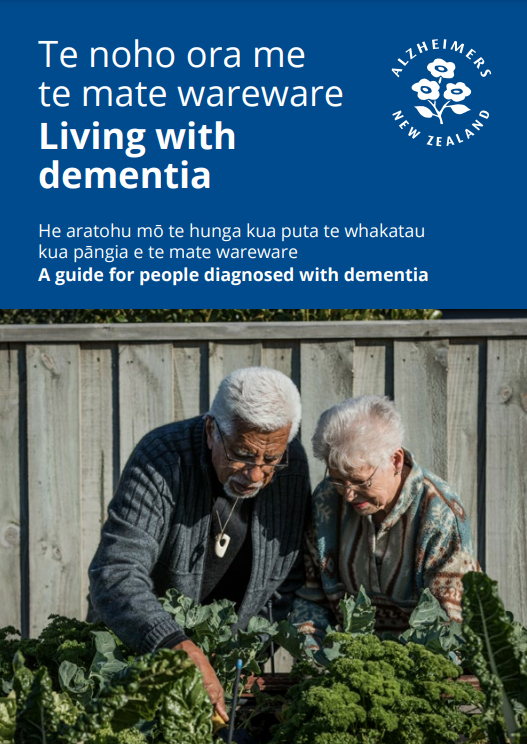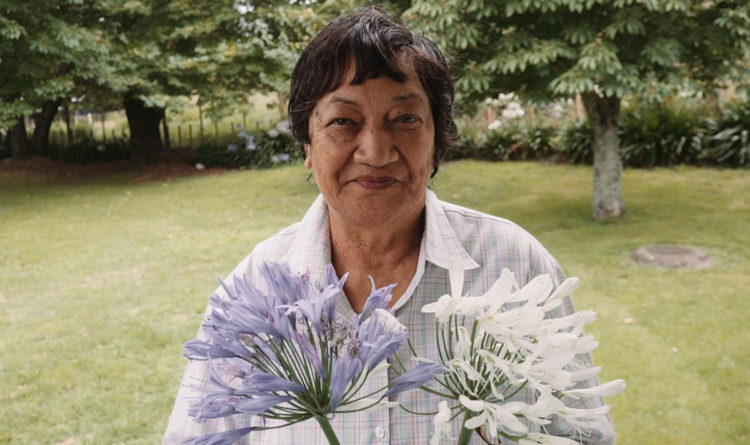Ngā āhuatanga noho o ia rā – Everyday life
You might be finding it harder to do some things you once did easily.

You might be finding it harder to do some things you once did easily. Preparing meals, shopping and even getting dressed are examples of things that may become increasingly more difficult and take longer to do. You can help manage this by:
- giving yourself more time to do things – start early to get things done
- having routines
- taking a break for a while if something is too difficult
- breaking a task down into smaller steps, then taking it one step at a time
- asking someone to help you with difficult tasks, or just the difficult bits of a task, such as doing up the buttons on a shirt or writing shopping lists.
Communicating
Everyone’s experience with dementia is different. That’s because everyone’s brains are different and because there are many forms of dementia, each affecting the brain in different ways. Nevertheless, difficulty with communication is a significant part of living with dementia for everyone.
The inability to communicate and make yourself understood can be very frustrating and you might feel more stress, anger and resentment. As part of your dementia, you may have difficulty:
- finding the right words, or get words mixed up
- processing and understanding what other people are saying to you, or you might get only part of it
- reading and writing.
Your friends and whānau may notice:
- while you’re speaking fluently, they’re not able to understand what you’re saying
- you lose the normal social conventions and may unintentionally interrupt or ignore people
- you find it hard to follow conversations, too many people talking at once may be overwhelming, e.g., family functions and so having a conversation with just one person maybe easier for you
- a you have more difficulty expressing what you’re feeling.
Being able to communicate helps keep you socially connected. If you’re finding communication difficult, discuss this with the people closest to you and work out ways to make communicating easier – maybe using pictures or cards you can point to will help.
Ask your primary care provider for a referral to a Speech-Language Therapist.
A speech and language therapist works with people to improve their communication and swallowing abilities. They aim to maintain the person’s quality of life for as long as possible. They can assess thinking skills which affect communication e.g. memory, attention. They may also talk to the people you communicate with the most, so those people have the skills to help you keep conversing.
They can work with you to practice remembering important information, create conversation aids e.g. memory books, and give friends and whānau training on keeping communication going. The speech and language therapist can also assess your swallowing abilities and put strategies in place that make the swallow safer or more comfortable
Other reasons that may affect communication
It’s important to think about what else might be causing you trouble when communicating. It’s a good idea to have your eyesight and hearing checked regularly as glasses and hearing aids may help. Other suggestions to make communication easier include:
- Take your time.
- Tell people you have a problem with thinking, communicating and remembering.
- If you don’t understand what someone says, ask them to repeat it.
- Remember it’s okay to ask something over and over again.
- If too many people or too much noise bothers you, such as in shopping malls or supermarkets, try and avoid those places at
busy times – wearing ear plugs in noisy environments may help but take them out if you want to talk to someone! - If you lose a thought, let it go – it’s okay if you forget it and it might come back to you later.
- Use body language. There’s more to communication than words. When we communicate, more than half of what we say is conveyed through body language, while another large
proportion comes from the tone and pitch of our voice. - If you can’t find the words to make yourself understood, remember that facial expressions and gestures can help.
Finding your way
When you’re out and about there may be days when finding your way becomes difficult. Things that are usually familiar become unfamiliar and this can be confusing and frightening.
But it’s really important you continue with your usual social activities, sport and exercise as much as you can.
Here are some suggestions to help you keep the confidence to go out:
- Have a whānau discussion about how to support your ability to get out and about. This can be part of advanced support planning after the diagnosis of dementia is made.
- Carry identification with you, which includes your name, address, phone number and emergency contacts. Make sure the information is kept up to date and keep it with you at all times.
- Consider a locator device such as a mobile phone with a GPS function, or specialised devices using GPS or radio frequencies. Your local Alzheimers or Dementia organisation can provide information about available technology.
- Take familiar routes each time you go for a walk.
- Try not to be afraid to ask for help when you need it.
- Explain to people that you have a memory problem and need some help.
Managing your health
Dementia is a chronic health condition and, as with any other chronic conditions, it’s important to look after your health.
You can do this by:
- staying active and doing regular exercise – this might include walking, gardening or sports
- keeping socially connected
- eating a balanced diet
- making sure you have time to relax each day
- resting when you are tired
- getting a good nights sleep – if you have sleep problems see Health Navigator
- getting hearing loss checked and wearing a hearing aid if needed
- limiting how much alcohol you drink
- having a regular health check-up with your GP
- taking your medication as prescribed – talk to your pharmacist about putting your medicines in a blister pack if you’re having trouble remembering what to take and when. See Health Navigator for tips on remembering to take your medicine
- keeping involved with your social activities and your hobbies – rather than giving up things you love to do, see if you can modify them to suit your abilities.
-

Booklet: Living with dementia
A guide for people diagnosed with dementia
This booklet is written for people who have been diagnosed with dementia to give you information and to help you continue to live well.
The booklet suggests ways to look after yourself including how to adjust to change and managing your day, as well as working, driving, keeping involved and active and planning for the future.


